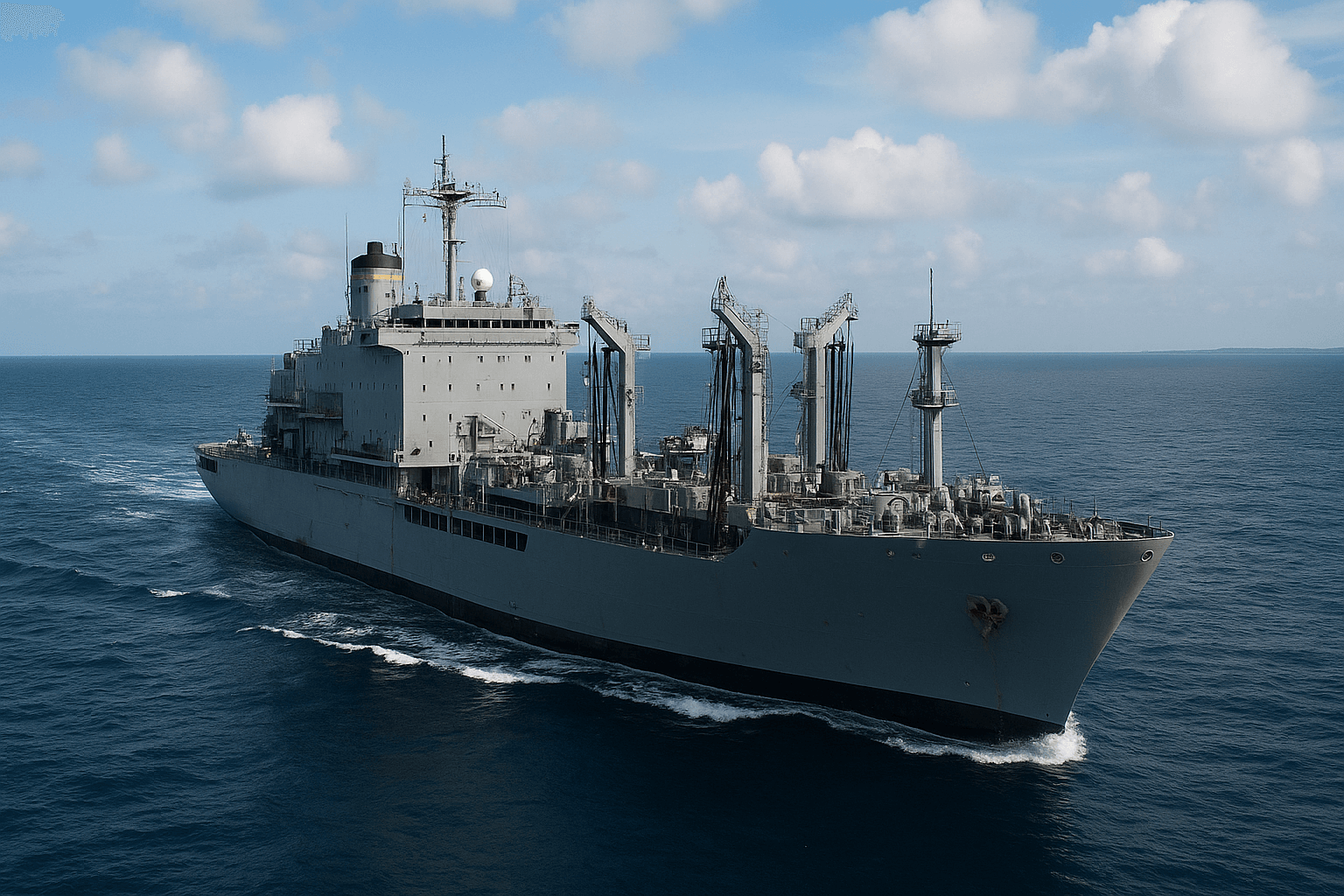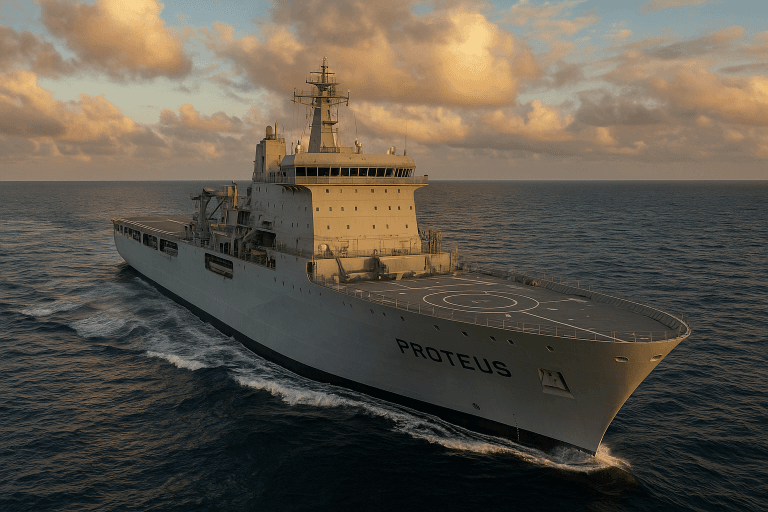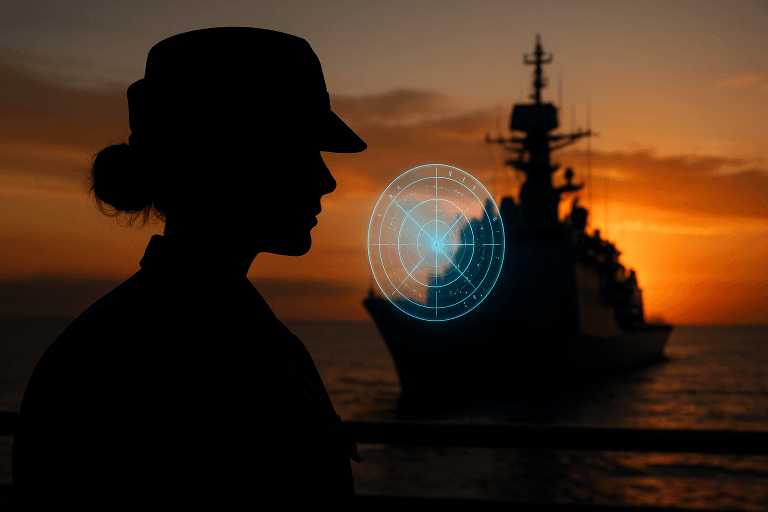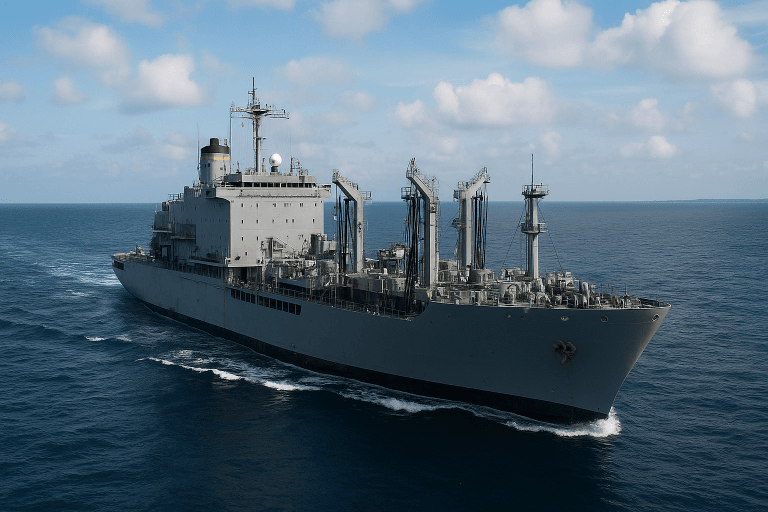
Introduction to Fleet logistics support
It is imperative that naval operations are not sustained by warships and aircraft carriers alone. There lies a complex system of support that ensures fuel, ammunition, food, spare parts, and medical care that reaches sailors and marines wherever they are deployed. This system of supply chain of essentials is known as Fleet Logistics Support (FLS). FLS forms the backbone of modern naval power projection.
The Role of Fleet Logistics Support in Naval Operations
Fleet Logistics Support helps in Sustainment at Sea Fleet. Oilers, supply ships, and fast combat support vessels allow warships to remain operational without returning to port. Fleet Logistics Support Enables extended deployments, crucial for global presence and deterrence.
Fleet Logistics Support helps in enhancing Global Reach. Fleet Logistics Support provides the mobility and endurance needed for navies to operate across oceans. Fleet Logistics Support ensures that ships can operate far from home bases while maintaining combat readiness.
Fleet Logistics Support enhances Rapid Response Capability of the navy. Fleet Logistics Support units deliver emergency supplies, humanitarian aid, and disaster relief during crises situations. Fleet Logistics Support is critical in joint and coalition operations. Fleet Logistics Support works wonders in ensuring interoperability with allied navies.
Fleet Logistics Support extends Medical and Personnel Support in Naval Operations. Hospital ships, casualty evacuation systems, and personnel rotation keep sailors fit for duty during naval operations. Additionally, it enhances morale and operational effectiveness of the Navy.
Key Assets in Fleet Logistics Support
Fleet Oilers (AO/AOE) provide fuel and lubricants to ships at sea. Fast Combat Support Ships (AOE) Combine fuel, ammunition, and supply delivery in one platform. Hospital Ships (T-AH) serve as Floating medical centers for combat support and humanitarian missions. Cargo and Ammunition Ships (T-AK/T-AE) deliver spare parts, provisions, and ordnance. Air Logistics (Fleet Logistics Support Squadrons – VR) provide long-range supply, personnel transport, and time-sensitive cargo delivery.
Strategic Importance of Fleet Logistics Support
Fleet Logistics Support Forces Projection, Sustains carrier strike groups, amphibious ready groups, and independent warships. Fleet Logistics Support enhances operational Flexibility in the naval operations by allowing commanders to deploy forces without reliance on host nation bases. Fleet Logistics Support fosters Resilience in Navy during Conflict by ensuring supply lines remain secure even under contested conditions.
Challenges and Future Trends of Fleet Logistics Support
Fleet Logistics Support has a major challenge which is Cyber-security & Digital Logistics by protecting data-driven supply chains from cyber threats. Fleet Logistics Support lacks resilient Supply Networks by building redundancy against blockades and disruptions. Fleet Logistics Support needs Autonomous Resupply by doing Experimentation with unmanned ships and drones for logistics missions. Green Fleet Initiatives is a major challenge of Fleet Logistics Support in transition to alternative fuels and energy-efficient systems.
Needless to say, Fleet Logistics Support is often less visible than aircraft carriers or submarines, but it is indispensable in ensuring smooth naval operations. It is imperative that without Fleet Logistics Support, naval operations would grind to a halt within few days. With the evolution of global threats, the navies operate in increasingly contested environments and the importance of logistics becomes much bigger with the passage of time. Therefore, fleet Logistics Support remains the unshakable backbone of naval operations by quietly enabling endurance, readiness, and global reach
Conclusion
It is imperative that naval operations are not sustained by warships and aircraft carriers alone. There lies a complex system of support that ensures fuel, ammunition, food, spare parts, and medical care that reaches sailors and marines wherever they are deployed. This system of supply chain of essentials is known as Fleet Logistics Support (FLS). FLS forms the backbone of modern naval power projection.
Fleet Logistics Support Forces Projection, Sustains carrier strike groups, amphibious ready groups, and independent warships. Fleet Logistics Support enhances operational Flexibility in the naval operations by allowing commanders to deploy forces without reliance on host nation bases. Fleet Logistics Support fosters Resilience in Navy during Conflict by ensuring supply lines remain secure even under contested conditions.
Fleet Logistics Support has a major challenge which is Cyber-security & Digital Logistics by protecting data-driven supply chains from cyber threats. Fleet Logistics Support lacks resilient Supply Networks by building redundancy against blockades and disruptions. Fleet Logistics Support needs Autonomous Resupply by doing Experimentation with unmanned ships and drones for logistics missions. Green Fleet Initiatives is a major challenge of Fleet Logistics Support in transition to alternative fuels and energy-efficient systems.
Fleet Logistics Support Forces Projection, Sustains carrier strike groups, amphibious ready groups, and independent warships. Fleet Logistics Support enhances operational Flexibility in the naval operations by allowing commanders to deploy forces without reliance on host nation bases. Fleet Logistics Support fosters Resilience in Navy during Conflict by ensuring supply lines remain secure even under contested conditions.




